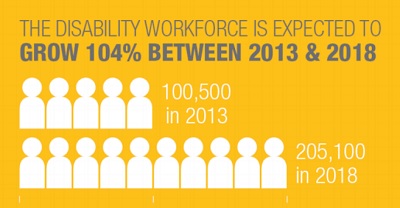The NDIS: What we know so far
There is a new sense of anticipation and energy around the NDIS following the launch of the Nepean Blue Mountains transition site in July this year and the announcement that Queensland was bringing forward the roll out of its sites in 2016. So, we thought now is the perfect time to hit the refresh button on our knowledge of the NDIS and how it affects us.
What is the NDIS?
The NDIS stands for the National Disability Insurance Scheme. It’s a new government policy that aims to transform the way Australia supports people with permanent and significant disability. The foundations of the NDIS are built on two key pillars:
- It’s a universal system. That means it will provide supports to all eligible Australians to ensure that people with disability, their families and carers get the support they need.
- It’s about more choice and control. The NDIS is based on the idea that people with disability should be able to set their own goals and to the extent that is reasonably possible, choose their own supports.
How will the NDIS affect the people I support?
The NDIS means that people with disability will have control over their own support budget. In other words, they will have a direct say and input into how they are supported. The idea is to provide people with disability access to tailored supports so they can achieve their goals and live inclusively in their communities.
What does the NDIS mean for me?
The NDIS will introduce a more dynamic, interesting, and diverse work environment where communication and adaptability are critical to success. Increased choice and control for participants may lead to supports being required at different days and times, requests for a greater variety of supports, and the prospect of extra hours for support workers as the scheme expands.
How will eligibility be assessed?
The NDIS will replace existing state and territory disability systems, which means the current ‘rationed’ system, will be replaced by an ‘entitlement’ model. As a result, people who are eligible to access NDIS supports will receive funding for what they need to live a full life, regardless of where they live, how much they earn, or their type of disability. For children, NDIS funding includes provision for early intervention supports which are designed to improve outcomes during their critical development years.
What does the NDIS mean for the disability sector?
Early signs suggest the sector will become more competitive as the NDIS rolls out, with a growing number of providers set to enter the sector in response to greater demand for services. However, increased competition also brings potential for growth. Disability funding in Australia will roughly double by the full roll out of the NDIS, while the disability workforce is expected to grow significantly through the creation of more fulltime, part-time and casual positions to provide tailored supports to NDIS participants.
Will more funding be made available?
Disability funding across Australia is increasing dramatically. By the time the NDIS is fully rolled out, national disability funding will have climbed from $7bn to $22bn. This means that more people with disability will receive the supports they need to live their lives. Across Australia, the number of people receiving disability supports will increase from 222,000 to 460,000.
How will my job change?
The NDIS has already seen frontline staff deliver more one-to-one support to people with disability. In addition to working with individuals on a more personal level, there will also be opportunities to work additional shifts as more funding is made available to people with disability.
Will the NDIS create opportunities for frontline staff?
Frontline staffs are now working in one of the fastest growing industries in Australia – and this is only going to continue. People with disability are working towards their NDIS goals, making it an exciting time for frontline workers to play a key role in this historic time of transition.
Did you know?
Under the NDIS, people are funded on an annual basis. That funding can go towards services, aids, equipment and care from a variety of providers. Unlike the old system, though, the NDIS is not about rationing. It’s about getting the plan right to support people with disability to achieve their life goals.







